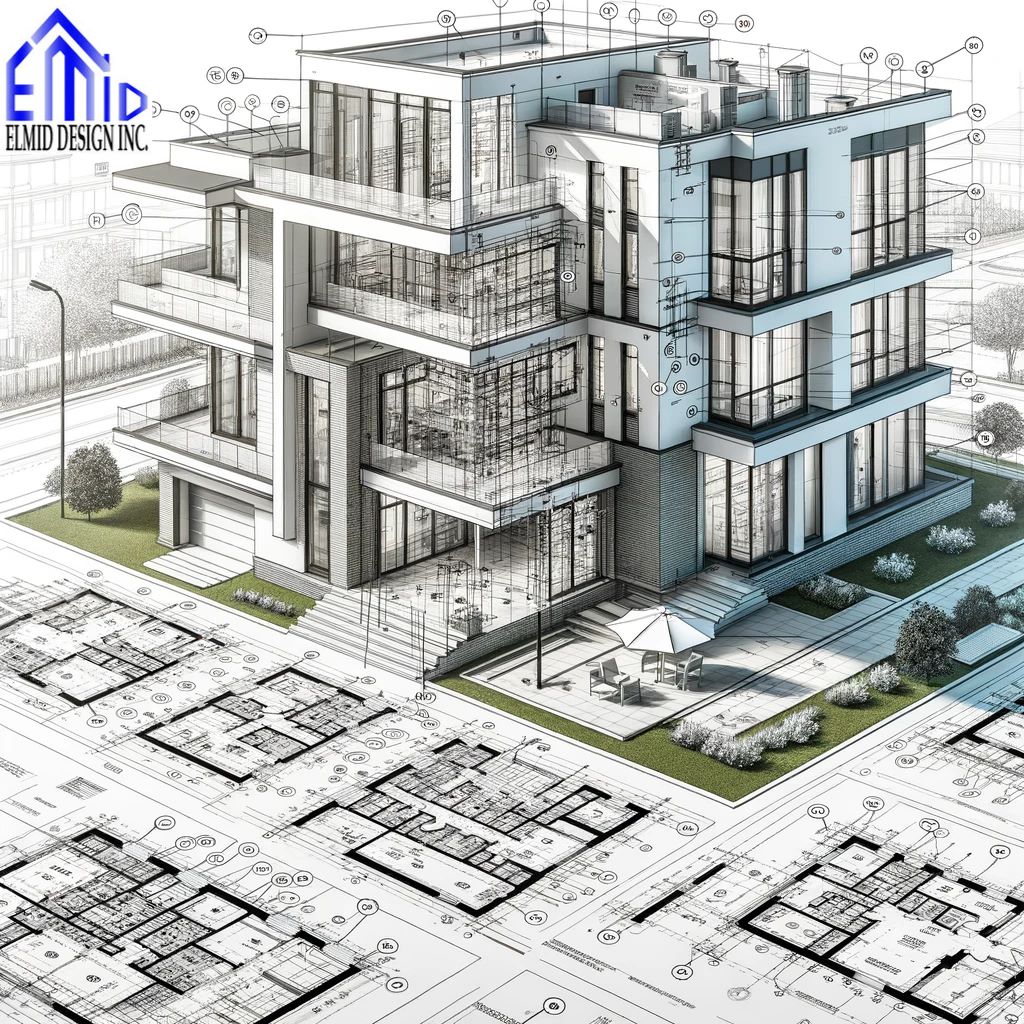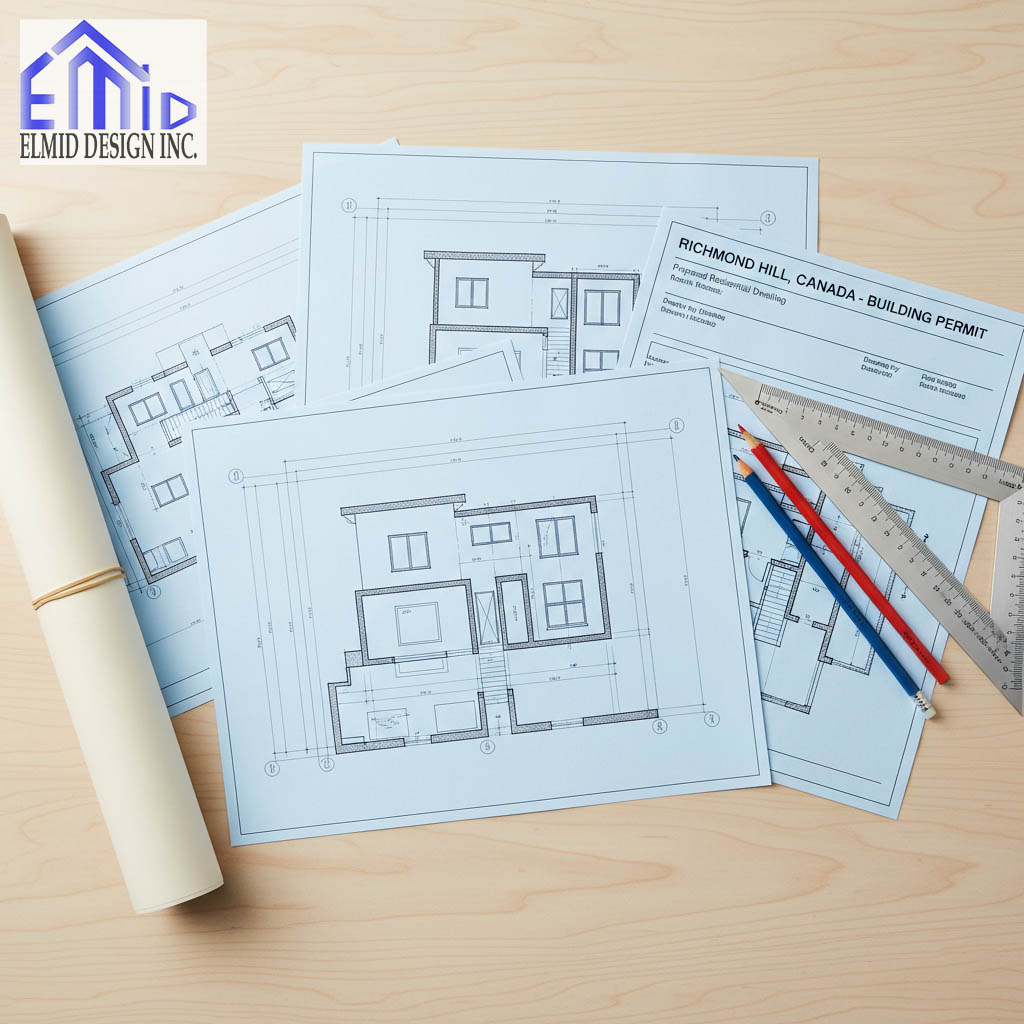A Richmond Hill Building Permit is more than just a document. It’s an essential approval that ensures every structure in the city is safe, legal, and built to meet the Ontario Building Code. Whether you’re planning a home addition, a basement renovation, or constructing a commercial property, securing a building permit in Richmond Hill protects your investment and avoids costly mistakes. This article explains everything you need to know about Richmond Hill Building Permits, including when you need one, how to apply, and how certified engineering companies like Elmid Design Inc, authorized by Professional Engineers Ontario (PEO), can help you get approved efficiently and professionally.
Key Takeaways
A Richmond Hill Building Permit is mandatory for most construction or renovation work.
It ensures compliance with local bylaws and safety codes.
The process involves document submission, review, and multiple inspections.
Working with licensed professionals such as Elmid Design Inc simplifies approvals and prevents costly delays.
Ignoring permit requirements can lead to fines or demolition orders.
Understanding the Richmond Hill Building Permit
A Richmond Hill Building Permit is an official authorization issued by the city’s Building Division that allows construction, demolition, or alteration of a structure. It confirms that the proposed work complies with the Ontario Building Code, municipal zoning bylaws, and applicable safety standards. Without a valid permit, any project can be stopped or deemed illegal. The permit process exists to protect homeowners and ensure public safety by enforcing uniform building practices across Richmond Hill.
Why You Need a Richmond Hill Building Permit
Obtaining a building permit in Richmond Hill is not optional. It’s a legal requirement that ensures every project meets structural, environmental, and fire safety standards. Homeowners often think small changes don’t need approval, but even minor renovations can affect a building’s integrity. A proper permit safeguards against liability issues and property value loss. When selling your home, unpermitted work can complicate transactions or even lead to failed inspections.
When a Richmond Hill Building Permit Is Required
A Richmond Hill Building Permit is required for most construction or renovation projects. This includes home additions, garage conversions, basement renovations, and deck installations. Any modification involving structural changes, plumbing, or electrical work typically needs a permit. Even demolitions and new driveway installations may require approval. Only cosmetic updates, like painting or flooring, are generally exempt. Confirming requirements with the city or a licensed engineering consultant prevents unnecessary rework.
The Legal Framework Behind Building Permits
The Richmond Hill Building Permit process operates under the Ontario Building Code and municipal bylaws. These regulations establish minimum standards for construction safety, energy efficiency, and design. The Building Code outlines specific rules for load-bearing walls, fire separations, and accessibility. Municipal zoning bylaws determine how land can be used and what structures are allowed. Together, they ensure Richmond Hill develops safely and sustainably while preserving community standards.
Types of Richmond Hill Building Permits
There are several categories of Richmond Hill Building Permits, depending on project type. Residential permits apply to homes, additions, decks, and interior renovations. Commercial permits cover offices, retail spaces, and industrial facilities. Demolition permits authorize tearing down a structure, while plumbing or mechanical permits handle specialized systems. Understanding the correct permit type before applying saves time and avoids rejection during review. Each permit type has distinct submission requirements and inspection stages.
Required Documents for a Richmond Hill Building Permit Application
A successful Richmond Hill Building Permit application must include accurate documentation. Essential items include site plans, architectural drawings, structural details, and specifications prepared by a qualified professional. If engineering input is needed, only companies like Elmid Design Inc, with authorization from Professional Engineers Ontario, can legally stamp drawings. Additional documents, such as an Energy Efficiency Design Summary and zoning compliance form, may also be required. Proper documentation ensures a smooth review and quicker approval.
How to Apply for a Richmond Hill Building Permit
Applying for a Richmond Hill Building Permit involves a structured process. Applicants must submit digital plans through the city’s online system or deliver printed drawings directly to the Building Division. The submission is reviewed for completeness and compliance with the Ontario Building Code. If revisions are needed, feedback is provided before final approval. Once granted, construction must follow the approved design strictly. Starting work before obtaining a permit can result in stop-work orders or penalties.
Fees and Costs for Richmond Hill Building Permits
Permit fees in Richmond Hill vary by project size and type. Residential permits typically depend on the floor area, while commercial permits may include mechanical or plumbing fees. There are also additional charges for re-inspections or plan revisions. The city calculates fees based on the estimated value of the work or the building’s square footage. Paying the correct fees upfront helps avoid delays. Consulting a licensed engineer or permit specialist ensures accurate cost estimation and submission.
Role of Inspections During Construction
After receiving a Richmond Hill Building Permit, inspections occur at various stages to verify compliance. Inspectors review structural framing, plumbing, and electrical systems to confirm that the work aligns with approved drawings. Missing an inspection or failing to call for one can halt your project until corrections are made. Keeping a record of passed inspections is crucial for obtaining the final occupancy permit. Inspections provide assurance that your construction meets the city’s safety standards.

Timeline and Processing Duration for a Richmond Hill Building Permit
The time required to process a Richmond Hill Building Permit depends on the project’s complexity and completeness of the application. Residential permits are often reviewed within ten business days if all documents meet the Ontario Building Code requirements. Larger commercial or multi-unit projects may take several weeks. Missing information or design changes extend the timeline significantly. Submitting a well-prepared application with complete drawings and reports ensures faster processing and minimizes costly back-and-forth with the city’s Building Division.
Common Mistakes When Applying for a Richmond Hill Building Permit
Many homeowners underestimate the level of detail required for a building permit. Submitting incomplete plans or using outdated zoning information can lead to rejections. Another frequent issue is beginning construction before receiving formal approval. This mistake often results in stop-work orders and additional fees. Hiring a professional firm like Elmid Design Inc helps prevent these delays because its engineers understand the submission standards required by Professional Engineers Ontario and the City of Richmond Hill. Proper planning always saves time and stress.
Permit Renewal and Extension Procedures
A Richmond Hill Building Permit remains valid while construction continues actively. However, if work stops for an extended period, the permit may expire. Renewing or extending a permit requires contacting the city’s Building Division before expiration. The request must include an explanation of delays and proof that the project still complies with current building codes. Renewal fees may apply. Maintaining communication with inspectors and following the approved schedule prevents unnecessary permit cancellations or reapplications.
Penalties for Building Without a Permit in Richmond Hill
Undertaking construction without a Richmond Hill Building Permit can lead to serious consequences. The city may issue a stop-work order, impose fines, or require demolition of unapproved structures. Homeowners may also face legal action if safety issues arise. Properties with unpermitted work often encounter difficulties during resale or refinancing because lenders and buyers demand legal compliance. Avoiding penalties is simple by applying for a proper permit and hiring licensed professionals such as Elmid Design Inc to ensure the work meets all standards.
The Inspection and Occupancy Permit Process
Once construction begins, several inspections confirm that each stage meets Richmond Hill’s safety and design standards. Inspectors review framing, insulation, plumbing, and electrical installations. Any deficiencies must be corrected before proceeding. After final approval, the city issues an occupancy permit confirming that the building is safe for use. Skipping inspections or making unauthorized modifications can delay the occupancy certificate. Maintaining open communication with the inspection department ensures smoother project completion and compliance with the Ontario Building Code.
How Elmid Design Inc Simplifies the Richmond Hill Building Permit Process
Elmid Design Inc specializes in helping property owners navigate the Richmond Hill Building Permit process with precision and efficiency. As a company holding a Certificate of Authorization from Professional Engineers Ontario, it provides structurally sound, code-compliant designs that meet municipal standards. The firm’s engineers prepare detailed plans and calculations to eliminate rejections and delays. Working with a qualified engineering partner ensures faster approvals, fewer revisions, and complete peace of mind throughout every phase of your construction project.
Benefits of Working with Licensed Engineers for Building Permits
Engaging a licensed engineer offers significant advantages when applying for a Richmond Hill Building Permit. Professional engineers ensure that structural integrity, load calculations, and safety standards meet provincial codes. They also provide stamped drawings accepted by municipal reviewers without additional verification. This expertise minimizes review time and guarantees that your project passes inspection. Firms like Elmid Design Inc, authorized by Professional Engineers Ontario, combine technical knowledge with local experience to deliver compliant, efficient, and reliable building permit solutions.
Understanding Zoning and Site Plan Requirements
Before obtaining a Richmond Hill Building Permit, zoning and site plan requirements must be satisfied. Zoning determines what type of construction is allowed on a specific property, including setbacks, height limits, and lot coverage. Site plan approval verifies that drainage, parking, and landscaping comply with city standards. Failing to confirm these details before applying often leads to delays or denials. A qualified engineer or planner can identify zoning constraints early and adjust the design accordingly, ensuring the project meets all regulations.
Sustainability and Energy Efficiency in Building Permits
The Richmond Hill Building Permit process also emphasizes environmental responsibility. Applicants must demonstrate compliance with energy efficiency standards under the Ontario Building Code. Proper insulation, high-performance windows, and efficient mechanical systems reduce energy consumption and operational costs. Sustainable design not only benefits the environment but also improves property value and comfort. Professional engineers can integrate green building techniques and certify energy-efficient systems that meet or exceed municipal expectations during permit review.
Richmond Hill Permit Checklist for Homeowners
Before beginning any construction, homeowners in Richmond Hill should follow a clear permit checklist to ensure compliance. Every project should start with confirming zoning regulations and property setbacks. After that, accurate drawings must be prepared by a qualified designer or engineer. The next step involves submitting the application through the city’s online portal along with all required documentation. Applicants should monitor the review status and respond quickly to feedback. Once the permit is issued, construction must follow the approved plans exactly. Any field changes must be resubmitted for review. Following this sequence guarantees a smooth experience and prevents costly penalties or project delays.
Basement Renovation Permits in Richmond Hill
A Richmond Hill Building Permit is required for most basement renovations, especially if structural or plumbing work is involved. Finishing a basement affects fire safety, ventilation, and insulation requirements under the Ontario Building Code. Homeowners must include plans showing wall layouts, electrical systems, and egress windows. Adding a secondary suite or rental unit requires additional approvals and inspections. Without proper authorization, homeowners risk penalties or legal issues during property sales. Engaging a professional firm such as Elmid Design Inc ensures your basement renovation meets all structural and safety standards while achieving full permit approval from the City of Richmond Hill.
Commercial Building Permits in Richmond Hill
Commercial developments in Richmond Hill require a more detailed permit process compared to residential projects. Each commercial permit must include architectural, mechanical, and structural drawings reviewed for code compliance. Accessibility and fire protection systems are evaluated carefully to meet public safety standards. Energy efficiency compliance also plays a major role during the review. Businesses that begin construction before securing permits face severe fines and delays. Professional engineering firms like Elmid Design Inc assist property owners by preparing certified drawings and coordinating with municipal reviewers to ensure all design aspects satisfy the Ontario Building Code and Richmond Hill’s regulations.
Accessory Structures and Deck Permits
Building an accessory structure or deck in Richmond Hill still requires an approved permit in most cases. Structures like detached garages, gazebos, and sheds must comply with zoning setbacks and height restrictions. Decks higher than sixty centimeters above ground need structural drawings to confirm safe support. Failure to obtain a permit can result in removal orders or penalties. An engineer can verify post spacing, footing depth, and connection details to meet the city’s standards. Working with Elmid Design Inc guarantees that your drawings are code-compliant and acceptable to the city’s Building Division, ensuring hassle-free approval.
Demolition Permits and Safety Considerations
Before removing any structure, a demolition permit must be secured from the City of Richmond Hill. The application must include site details, utility disconnection confirmation, and structural information. Demolition activities are regulated to protect adjacent properties and maintain safety. The city requires professional supervision for large demolitions to ensure controlled and environmentally responsible procedures. Ignoring this requirement may result in legal penalties or delays in rebuilding approvals. Consulting licensed engineers ensures that the demolition follows proper safety protocols and that all debris management complies with Richmond Hill’s environmental standards.
Engineering Design and Structural Review
Every Richmond Hill Building Permit requiring load-bearing modifications needs a structural review from a licensed engineer. Engineering design confirms that the proposed work can handle expected loads and environmental stresses. The engineer must seal drawings under Professional Engineers Ontario authorization, guaranteeing code compliance and professional accountability. Elmid Design Inc offers comprehensive structural assessments and stamped designs for both residential and commercial projects. Their expertise ensures that all calculations meet the Ontario Building Code, reducing review times and improving approval success rates. Accurate engineering design remains one of the most important elements of the permit process.
Importance of Code Compliance in Richmond Hill
Compliance with the Ontario Building Code is the foundation of any successful Richmond Hill Building Permit application. The code sets specific rules for structural integrity, energy conservation, accessibility, and fire safety. Every plan submission must demonstrate adherence to these regulations to obtain approval. Non-compliant designs are rejected immediately, causing significant delays. Professional engineers and designers who specialize in municipal requirements can ensure accuracy and consistency in all submissions. Maintaining full code compliance not only expedites permits but also ensures the long-term durability and safety of each construction project within Richmond Hill.
The Role of Inspections After Construction
After a Richmond Hill Building Permit is issued, multiple inspections occur throughout the construction process. Each inspection verifies that the work matches approved drawings and meets code standards. Inspectors review foundation, framing, insulation, and plumbing at different stages. Missing an inspection can delay project completion or occupancy certification. Maintaining open communication with inspectors helps resolve issues promptly. When construction passes all required inspections, the city issues a final occupancy permit confirming that the building meets all safety and design criteria. This step finalizes the building process and ensures compliance with municipal law.
How Elmid Design Inc Supports Homeowners and Developers
Elmid Design Inc provides complete support to homeowners and developers seeking Richmond Hill Building Permits. With authorization from Professional Engineers Ontario, the firm offers expert guidance through every stage, from design preparation to final inspection. Its engineers prepare precise drawings, conduct structural reviews, and liaise directly with municipal reviewers to accelerate approvals. By combining technical excellence with knowledge of local bylaws, Elmid Design Inc helps clients complete their projects efficiently while meeting all regulatory obligations. Their professionalism and accuracy establish trust and compliance throughout the permit process.
Future of Building Permits in Richmond Hill
Richmond Hill continues to modernize its building permit process through digital submissions and faster communication systems. Online applications allow homeowners and contractors to upload plans, track progress, and receive feedback without visiting city offices. Future improvements will focus on integrating sustainability and technology-driven inspection scheduling. The city’s commitment to innovation aims to make permit processing more efficient and transparent. Engineering companies like Elmid Design Inc remain essential partners in this evolution, ensuring that high-quality, code-compliant designs meet Richmond Hill’s growing urban development standards.
Final Thoughts on the Richmond Hill Building Permit Process
Securing a Richmond Hill Building Permit ensures that every construction project aligns with safety regulations and city planning objectives. From residential renovations to large commercial developments, understanding the application process and working with certified professionals reduces risks and ensures approval success. Elmid Design Inc continues to provide engineering excellence, combining technical accuracy with regulatory expertise to deliver trusted results. Following municipal requirements, maintaining transparency, and engaging qualified professionals create a seamless building experience that protects both property value and community standards in Richmond Hill.
Frequently Asked Questions About Richmond Hill Building Permits
What happens if I start construction without a Richmond Hill Building Permit?
Starting construction without an approved permit leads to stop-work orders and fines. The city may require you to remove or modify unapproved work to meet safety and code requirements before granting final approval.
How long does it take to get a Richmond Hill Building Permit?
Processing time depends on project complexity. Simple residential projects take around ten business days, while larger developments may need several weeks or more due to additional reviews or coordination with external agencies.
Do I need an engineer to apply for a Richmond Hill Building Permit?
Most structural or complex projects require drawings stamped by a Professional Engineer. Firms like Elmid Design Inc, authorized by Professional Engineers Ontario, prepare these documents to ensure compliance and faster approval.
What documents do I need for a Richmond Hill Building Permit?
Applicants must provide site plans, architectural drawings, energy summaries, and sometimes structural or mechanical reports. All documents must follow Ontario Building Code standards and Richmond Hill’s submission guidelines.
Can a Richmond Hill Building Permit expire?
Yes, permits can expire if construction does not begin or pauses for an extended time. Renewal requires approval from the city’s Building Division, including updated compliance verification.

Elmid Design Inc – Trusted Engineering Experts in Richmond Hill
Elmid Design Inc is a trusted engineering firm in Ontario, proudly holding a Certificate of Authorization from Professional Engineers Ontario. The company specializes in structural, architectural, and building permit design services across Richmond Hill and the Greater Toronto Area. With a focus on precision, compliance, and client satisfaction, Elmid Design Inc helps homeowners, developers, and contractors obtain fast, code-compliant approvals. Its expert team delivers reliable solutions that meet Ontario Building Code standards while ensuring safety, efficiency, and long-term value for every project.
Geographic Locations That We Service:
Our Licensed Professional Engineers specializing in Engineered Site Grading Plans offer the best-engineered site grading plan, lot grading and erosion plan, and drainage plan to obtain site plan approval and building permits in Ontario, including a wide range of municipalities. Each area boasts unique features and requirements, making our tailored approach essential for success.
Toronto and Surrounding Areas
In the vibrant heart of Ontario, we service Toronto (City of Toronto) and surrounding areas. Additionally, we cover Oshawa (City of Oshawa), Pickering (City of Pickering), and Clarington (Municipality of Clarington). Furthermore, our expertise extends to Ajax (Town of Ajax), Whitby (Town of Whitby), Brock (Township of Brock), Scugog (Township of Scugog), and Uxbridge (Township of Uxbridge).
Halton Region
Moving to the Halton Region, our services encompass Burlington (City of Burlington) and Halton Hills (Town of Halton Hills). Also included are Milton (Town of Milton) and Oakville (Town of Oakville).
Peel Region
In the Peel Region, we provide services in Brampton (City of Brampton), Mississauga (City of Mississauga), and Caledon (Town of Caledon).
York Region
Our services in the York Region cover Vaughan (City of Vaughan), Aurora (Town of Aurora), and East Gwillimbury (Town of East Gwillimbury). We also cater to Georgina (Town of Georgina), Markham (City of Markham), Newmarket (Town of Newmarket), Richmond Hill (City of Richmond Hill), Whitchurch-Stouffville (Town of Whitchurch-Stouffville), King (Township of King), and Bradford-West Gwillimbury (Town of Bradford-West Gwillimbury). Each municipality here offers a distinct setting, requiring our specialized approach.
Other Southern Ontario Cities and Towns
We also serve many other cities and towns in Southern Ontario. These include Hamilton (City of Hamilton), St. Catharines (City of St. Catharines), Niagara on the Lake (Town of Niagara on the Lake), Brant (County of Brant), Cambridge (City of Cambridge), Kitchener (City of Kitchener), Waterloo (City of Waterloo), and Woodstock (City of Woodstock). Furthermore, we operate in Guelph (City of Guelph), Centre Wellington (Township of Centre Wellington), Shelburne (Town of Shelburne), Orangeville (Town of Orangeville), New Tecumseth (Town of New Tecumseth), Essa (Town of Essa), Collingwood (Town of Collingwood), Wasaga Beach (Town of Wasaga Beach), Barrie (City of Barrie), Midland (Town of Midland), Orillia (City of Orillia), Ramara (Town of Ramara), Minden Hills (Town of Minden Hills), North Kawartha (Town of North Kawartha), Kawartha Lakes (City of Kawartha Lakes), Peterborough (City of Peterborough), Selwyn (Town of Selwyn), and Brighton (Municipality of Brighton).




